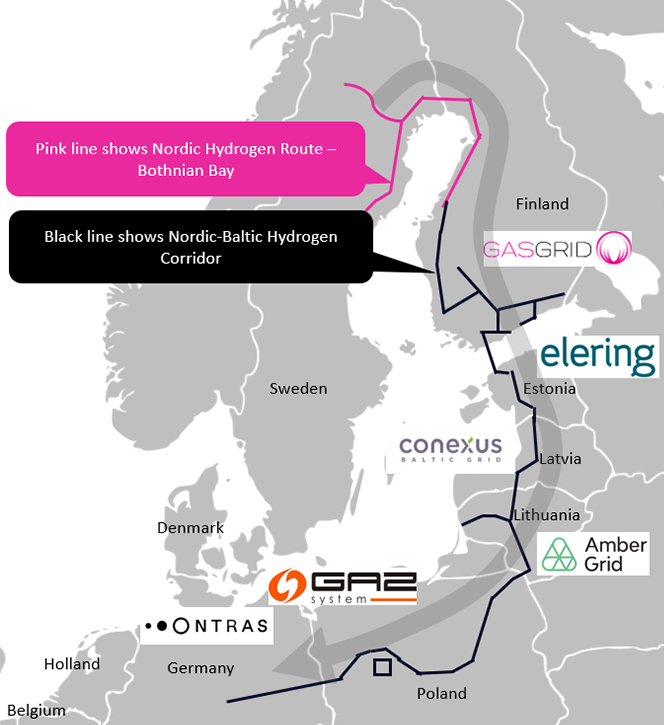Six partners have signed a cooperation agreement to develop Nordic-Baltic Hydrogen Corridor
Press Release - Ontras
The EU member states are currently in the process of dynamic changes related to the energy transformation and the decarbonisation of the European economy. Hydrogen is expected to be one of the key fuels in the EU's energy transformation. Now, the gas transmission systems operators (TSOs) are moving in good collaboration from European Hydrogen Backbone (EHB) vision to action. On December 14, 2022 TSOs from six EU countries signed a cooperation agreement on a cross border project, Nordic-Baltic Hydrogen Corridor.
The European TSOs Gasgrid Finland (Finland), Elering (Estonia), Conexus Baltic Grid (Latvia), Amber Grid (Lithuania), GAZ-SYSTEM (Poland) and ONTRAS (Germany) have signed a cooperation agreement to develop hydrogen infrastructure from Finland through Estonia, Latvia, Lithuania and Poland to Germany to meet the REPowerEU 2030 targets. The TSOs have initiated a project called Nordic-Baltic Hydrogen Corridor that will strengthen region’s energy security, reduce the dependency of imported fossil energy and play a prominent role in decarbonising societies and energy-intensive industries along the corridor. It also has significant potential to contribute to the EU’s greenhouse gas emission reduction target by replacing today’s fossil-based production and fossil fuel consumption in industry, transport sector, electricity and heating, with these based on new renewable fuel, i.e., green hydrogen.

Nordic-Baltic Hydrogen Corridor supports diversification of energy supplies, and accelerated roll-out of renewable energy allowing in particular for achieving the EU target of 10 million tonnes of domestic renewable hydrogen production by 2030. The corridor can transport green hydrogen produced in the Baltic Sea area to supply consumption points and industrial clusters along the whole corridor, as well as in central Europe.
In addition, when the hydrogen infrastructure develops further around the Baltic Sea, a strong market for hydrogen can be created enabling access to abundantly available and competitive renewable energy resources.
The project strongly supports EU hydrogen strategy and REPowerEU plan. In addition, the Nordic-Baltic Hydrogen Corridor will support several regional and EU climate targets, such as the EU Green Deal, Fit for 55 package.
Going forward
Taking into account the complexity of the project, project partners take proactive steps toward project implementation. In 2023, during the first phase of the project development, the project partners will conduct a pre-feasibility study. Based on the pre-feasibility study recommendations, a decision on continuation of the project development would be made. Following phases in the project would include engineering and permitting phase, construction and commissioning.




Comments